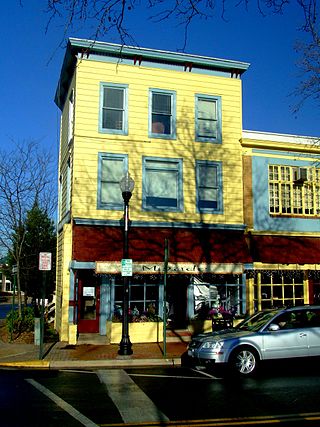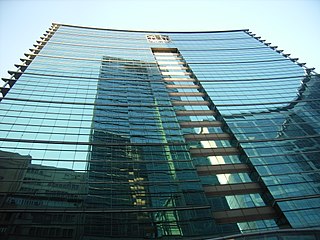
In urban planning, zoning is a method in which a municipality or other tier of government divides land into "zones", each of which has a set of regulations for new development that differs from other zones. Zones may be defined for a single use, they may combine several compatible activities by use, or in the case of form-based zoning, the differing regulations may govern the density, size and shape of allowed buildings whatever their use. The planning rules for each zone determine whether planning permission for a given development may be granted. Zoning may specify a variety of outright and conditional uses of land. It may indicate the size and dimensions of lots that land may be subdivided into, or the form and scale of buildings. These guidelines are set in order to guide urban growth and development.
Zone, Zones or The Zone may refer to:
Gallery or The Gallery may refer to:
Extra, Xtra, or The Extra may refer to:

Land use planning or Land-use regulation is the process of regulating the use of land by a central authority. Usually, this is done to promote more desirable social and environmental outcomes as well as a more efficient use of resources. More specifically, the goals of modern land use planning often include environmental conservation, restraint of urban sprawl, minimization of transport costs, prevention of land use conflicts, and a reduction in exposure to pollutants. In the pursuit of these goals, planners assume that regulating the use of land will change the patterns of human behavior, and that these changes are beneficial. The first assumption, that regulating land use changes the patterns of human behavior is widely accepted. However, the second assumption - that these changes are beneficial - is contested, and depends on the location and regulations being discussed.
Catalog or catalogue may refer to:

Subdivisions are land that is divided into pieces that are easier to sell or otherwise develop, usually via a plat. The former single piece as a whole is then known as a subdivision. Subdivisions may be simple, involving only a single seller and buyer, or complex, involving large tracts of land divided into many smaller parcels. If it is used for housing it is typically known as a housing subdivision or housing development, although some developers tend to call these areas communities.
Functional zoning, functional city zoning, or use-based zoning is a method used for dividing land use by its function. Typically, land use is divided in two ways, by its function and by its physical characteristics. An example of functional zoning would be an area that has designated zones based on a function such as an industrial zone, a recreational zone and a residential zone. An example of an area zoned by its physical characteristics is defined in terms of characteristics like development density, minimum lot size, and building coverage, placement and height.
Highest and best use is a concept in real estate appraisal that originated with early economists such as Irving Fisher, who conceptualized the idea of maximum productivity.

Commercial property, also called commercial real estate, investment property or income property, is real estate intended to generate a profit, either from capital gains or rental income. Commercial property includes office buildings, medical centers, hotels, malls, retail stores, multifamily housing buildings, farm land, warehouses, and garages. In many U.S. states, residential property containing more than a certain number of units qualifies as commercial property for borrowing and tax purposes.

Commercial areas, commercial districts or commercial zones in a city are areas, districts, or neighborhoods primarily composed of commercial buildings, such as a strip mall, office parks, downtown, central business district, financial district, "Main Street", or shopping centers. Commercial activity within cities includes the buying and selling of goods and services in retail businesses, wholesale buying and selling, financial establishments, and a wide variety of uses that are broadly classified as "business." While commercial activities typically take up a relatively small amount of land, they are extremely important to a community's economy. They provide employment, facilitate the circulation of money, and often serve many other roles important to the community, such as public gathering and cultural events.

Mixed use is a type of urban development, urban design, urban planning and/or a zoning classification that blends multiple uses, such as residential, commercial, cultural, institutional, or entertainment, into one space, where those functions are to some degree physically and functionally integrated, and that provides pedestrian connections. Mixed-use development may be applied to a single building, a block or neighborhood, or in zoning policy across an entire city or other administrative unit. These projects may be completed by a private developer, (quasi-)governmental agency, or a combination thereof. A mixed-use development may be a new construction, reuse of an existing building or brownfield site, or a combination.
Spot zoning is the application of zoning to a specific parcel or parcels of land within a larger zoned area when the rezoning is usually at odds with a city's master plan and current zoning restrictions. Spot zoning may be ruled invalid as an "arbitrary, capricious and unreasonable treatment" of a limited parcel of land by a local zoning ordinance. While zoning regulates the land use in whole districts, spot zoning makes unjustified exceptions for a parcel or parcels within a district.

Zoning is a law that divides a jurisdiction's land into districts, or zones, and limits how land in each district can be used. In the United States, zoning includes various land use laws enforced through the police power rights of state governments and local governments to exercise authority over privately owned real property.
Commercial zone may refer to:
Planning commissions are governmental bodies that make decisions about either Land-use planning or Economic planning, depending on the jurisdiction.

The Town Planning Board is a statutory body of the Hong Kong Government tasked with developing urban plans with an aim to ensuring the "health, safety, convenience and general welfare of the community through the process of guiding and controlling the development and use of land, and to bring about a better organised, efficient and desirable place to live and work." It is founded upon section 2 of the Town Planning Ordinance.







